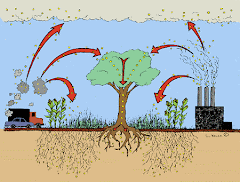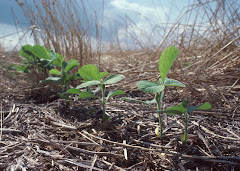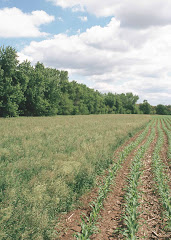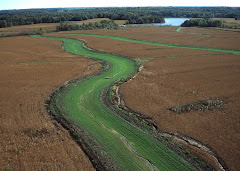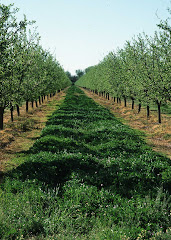Fred Yoder again, just wrapping up here at the UN Climate Change conference in Poznan, Poland. Today is the last day, and it has been a busy one. Al Gore addressed the delegation this afternoon as sort of a send-off to get ready for the final meeting in Copenhagen a year from now.
As we part from here, I do think there were many positive things that occurred. Yesterday and today, Sara Brodnax and I had meaningful exchanges with representatives from the EU, Brazil and India concerning agricultural solutions to climate change. As I said before, the ag presence here was next to nill, except for Brazil showcasing their low-carbon biofuels production. As we talked to them about soil carbon sequestration programs, it was not even on their radar screen. All who we talked to were very interested in continuing to exchange ideas and possibly develop ag-based solutions for this new treaty. In our discussions, it became apparent this type of program would benefit the developing countries as well since it could be implemented in a size-neutral way, giving everyone a stake in the solution regardless of their size or economic situation. Every country grows food.
As we leave Poznan, I can only hope we can continue to develop these new relationships and form meaningful partnerships. We need to develop ideas that would benefit all of the world's agriculture producers, and come back to the next conference with a real emphasis on agriculture as a major player. Together, we can have a real impact. As the world economic outlook looks bleak at the moment, surely we can be a driver to create efficient and economic incentives through the growing of crops worldwide while reducing our carbon footprint. At the same time I hope to continue building on those relationships with the legislative staff from the US who attended as well as we develop our own climate legislation.
So long from Poland,
Fred Yoder
Friday, December 12, 2008
Thursday, December 11, 2008
Poznan Update
Hello all, it’s Sara B here in Poznan as well. Today is the beginning of the high-level discussions among the heads of state and ministers here in Poland. These sessions of the Conference of the Parties (COP) conclude several weeks of meetings on technical aspects of the agreements that are taking shape in preparation for the negotiations next year in Copenhagen.
It is very clear that everyone is watching the United States to see how we move forward with climate change under the next administration … words like anticipation and expectation come to mind. On the US side, it seems that one likely scenario is that Congress may pass some type of “placeholder” legislation in the next year to outline GHG emission reduction targets and the structure of a cap-and-trade program. This (theoretically) would create the structure needed in order for the US to participate in developing the next international treaty on climate change in Copenhagen while leaving room for future iterations and improvements.
On the ag side, there has been some limited discussion here in Poznan on agriculture and soil carbon sequestration. Many expect that agriculture will increasingly enter the negotiations as ag producer countries such as the United States and Brazil become more involved in crafting the solution to climate change. There has also been a good deal of discussion on Reduced Emissions from Deforestation and Degradation (REDD), a proposal to slow tropical deforestation in developing countries (with implications for land use change and carbon sequestration).
That's all for now, thanks for staying tuned with us here in Poland!
It is very clear that everyone is watching the United States to see how we move forward with climate change under the next administration … words like anticipation and expectation come to mind. On the US side, it seems that one likely scenario is that Congress may pass some type of “placeholder” legislation in the next year to outline GHG emission reduction targets and the structure of a cap-and-trade program. This (theoretically) would create the structure needed in order for the US to participate in developing the next international treaty on climate change in Copenhagen while leaving room for future iterations and improvements.
On the ag side, there has been some limited discussion here in Poznan on agriculture and soil carbon sequestration. Many expect that agriculture will increasingly enter the negotiations as ag producer countries such as the United States and Brazil become more involved in crafting the solution to climate change. There has also been a good deal of discussion on Reduced Emissions from Deforestation and Degradation (REDD), a proposal to slow tropical deforestation in developing countries (with implications for land use change and carbon sequestration).
That's all for now, thanks for staying tuned with us here in Poland!
Reporting from the UN Climate Conference
This is Fred Yoder again reporting from Poznan, Poland at the UN Climate Conference. Well, it has been an interesting couple of days so far. There are lots of meetings to pick and choose from as to what to attend. I have been trying to learn how other countries are regarding agriculture as part of a possible solution in the reduction of GHG. Unfortunately, there are very few countries here that I have been able to find as really engaged from that aspect. Brazil has probably taken the most active role in showcasing their renewable fuel production portfolio and talking about all they are doing in their quest for reducing GHG. Really, from what I have seen so far, we have a lot of work to do in talking up the benefits and possibilities that agriculture has to offer in this arena. This afternoon we are going to attempt to talk to some representatives from the E.U. countries to get their level of interest in pursuing the development of ag credits. There has been some real progress in the protocols to include ways the developing countries can get on board with the new agreement by using credits from the forestry sector whereby over time they can transition into more specific reduction systems. Lots of dialogue, and lots of possibilities. More later.
Fred Yoder
Fred Yoder
Wednesday, December 10, 2008
Hello from Poznan
This is Fred Yoder reporting to you from the UN Climate Conference in Poznan, Poland. I find it striking that as serious a subject that climate and GHG is, and will affect all of agriculture, I believe I am the only producer from the United States that I know of that is here in attendance. So far, Sara Brodnax and I have linked up with many U.S. legislative staff who are in attendance, and have had some great dialogue with others here from the European Union. I am trying to get a perspective of Europe's attitudes toward cap and trade, since they have had some challenges getting their systems to work. Also, it has been interesting to just observe all of the over 650 NGOs here in attendance and their various perspectives of what should happen as possible solutions. It is certainly evident that it is important to be present to represent one's own ideas, because if not, someone else will, and it may not be the desired message.
I am looking forward to a full day of meetings. It is difficult at times to decide which ones to attend because there are many which would be beneficial to sit in on. I just feel it is vitally important these folks understand the perspective and needs of both agriculture and forestry concerning these issues.
More later,
Fred Yoder
I am looking forward to a full day of meetings. It is difficult at times to decide which ones to attend because there are many which would be beneficial to sit in on. I just feel it is vitally important these folks understand the perspective and needs of both agriculture and forestry concerning these issues.
More later,
Fred Yoder
Friday, December 5, 2008
Poland Climate Talks
Hello, it's Sara B again. I will be leaving shortly for Poznan, Poland to observe the UN climate change conference next week.
What's happening in Poznan? Well, the UN climate people (under the UNFCCC or United Nations Framework Convention on Climate Change) and member country delegates (forming the COP or the Conference of the Parties) are meeting to discuss the current international agreement on climate change (the Kyoto Protocol). This conference is part of the process that will shape the agreement to succeed the Kyoto Protocol, which is set to expire in 2012. These discussions started last year in Bali and will end next year in Copenhagen.
What do I expect? Well, a lot of anticipation and speculation about how the US is going to handle climate change under the new Obama administration (note that the Bush administration will be officially representing the US at this COP). That is, will the US ratify the upcoming agreement or move forward with cap-and-trade on their own or ??
I'll be listening in particular for discussion of approaches to mitigation, including policies for soil carbon sequestration and avoided deforestation. There will likely be some buzz about how countries such as Brazil will be approching avoided deforestation. Brazil just announced bold targets for avoided deforestation and signed a landmark agreement with California and other states on REDD (Reduced Emissions from Avoided Deforestation and Degradation, more on this later).
Anyway, stay tuned and check back as I hope to blog from Poland if possible.
What's happening in Poznan? Well, the UN climate people (under the UNFCCC or United Nations Framework Convention on Climate Change) and member country delegates (forming the COP or the Conference of the Parties) are meeting to discuss the current international agreement on climate change (the Kyoto Protocol). This conference is part of the process that will shape the agreement to succeed the Kyoto Protocol, which is set to expire in 2012. These discussions started last year in Bali and will end next year in Copenhagen.
What do I expect? Well, a lot of anticipation and speculation about how the US is going to handle climate change under the new Obama administration (note that the Bush administration will be officially representing the US at this COP). That is, will the US ratify the upcoming agreement or move forward with cap-and-trade on their own or ??
I'll be listening in particular for discussion of approaches to mitigation, including policies for soil carbon sequestration and avoided deforestation. There will likely be some buzz about how countries such as Brazil will be approching avoided deforestation. Brazil just announced bold targets for avoided deforestation and signed a landmark agreement with California and other states on REDD (Reduced Emissions from Avoided Deforestation and Degradation, more on this later).
Anyway, stay tuned and check back as I hope to blog from Poland if possible.
Subscribe to:
Posts (Atom)
